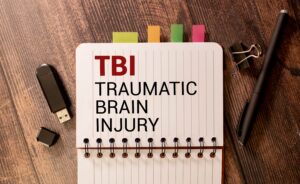How Much Will I Get for Pain and Suffering After a TBI?
How Much Will I Get for Pain and Suffering After a TBI?

If you or a loved one has suffered a traumatic brain injury (TBI) due to someone else’s negligence, you may be entitled to compensation for your pain and suffering. It’s important to consult with an experienced San Bernardino brain injury lawyer who can evaluate your case and fight for the maximum settlement you deserve.
Schedule a Free Initial Consultation Today!
The Devastating Impact of Traumatic Brain Injuries
A traumatic brain injury can occur when a sudden trauma causes damage to the brain. TBIs often result from:
- Car accidents
- Truck accidents
- Motorcycle crashes
- Slip and falls
- Sports injuries
- Assaults
- Explosions
The effects of a TBI can be profound and long-lasting. Victims may suffer from physical impairments, cognitive deficits, emotional disturbances, and personality changes. A severe TBI can leave a person unable to work, struggling with daily activities, and requiring lifelong care.
The Financial Burden of a TBI

In addition to the physical and emotional toll, traumatic brain injuries often create an overwhelming financial burden. Medical expenses can quickly pile up, including:
- Emergency room visits
- Hospitalization
- Surgery
- Medications
- Rehabilitation
- In-home care
- Adaptive equipment
A TBI victim may also suffer lost income if they are unable to work during recovery or can no longer work due to disability. The lifetime costs of a traumatic brain injury can reach millions of dollars.
What is Pain and Suffering?
When you file a personal injury claim after a TBI, you can seek compensation for economic damages like lost income and medical bills. You can also pursue non-economic damages for your “pain and suffering.”
Pain and suffering refers to the physical pain and emotional anguish caused by an injury. It includes things like:
- Physical pain and discomfort
- Mental anguish
- Emotional distress
- Loss of enjoyment of life
- Disfigurement
- Disability
Pain and suffering damages attempt to compensate you for the negative ways the injury has impacted your life and well-being. Since these damages are intangible, they can be more difficult to quantify than economic losses.
Factors That Impact Pain and Suffering Awards
So, how much can you expect to receive for pain and suffering after a traumatic brain injury? There is no set formula, as each case is unique. However, several key factors will impact the value of your claim:
Severity of the Injury
One of the most important factors in determining pain and suffering damages is the seriousness of your traumatic brain injury. In general, the more severe and permanent the effects of the TBI, the higher the compensation you can expect to receive.
For example, if you suffered a concussion that healed with rest after a few weeks, your pain and suffering damages will likely be on the lower end. However, if you sustained a severe TBI that caused significant cognitive impairments, physical disabilities, and changes in personality and behavior, you will probably be entitled to a much larger award.
The severity of a TBI is typically evaluated using medical evidence such as brain scans, neurological exams, and cognitive assessments. The more profound and long-lasting the impact of the injury on your brain function, the more pain and suffering you’ve endured.
Required Medical Treatment

The type and duration of medical treatment you need after a TBI can also demonstrate the extent of your pain and suffering. The more intensive and prolonged the treatment, the greater the assumed suffering.
For instance, if your TBI requires emergency surgery, a lengthy hospitalization, and months of inpatient rehabilitation, this will suggest a higher level of pain and suffering than an injury that was treated with rest and a few follow-up doctor visits.
Ongoing medical needs, such as medication management, psychological counseling, physical therapy, occupational therapy, and speech therapy, can also be used as evidence of continued suffering. The more medical intervention required to treat the effects of the TBI, the more compensation you may be entitled to.
Prognosis
Your expected long-term outcome and prognosis after a TBI will also impact your pain and suffering award. In general, the more permanent and life-altering the consequences of the injury, the higher the damages.
For example, if your doctor expects you to make a full recovery with no lasting impairments, your pain and suffering will likely be valued lower than if you are expected to have persistent cognitive deficits, physical disabilities, or other permanent limitations.
Factors that can influence your prognosis include the severity of the initial injury, your age and pre-existing health status, and your response to rehabilitation. Expert medical testimony from neurologists, neuropsychologists, and rehabilitation specialists may be used to establish your anticipated long-term challenges and support your claim for damages.
Impact on Your Life
The jury or insurance company will also consider how the TBI has impacted your daily life and overall well-being to determine pain and suffering compensation. The more the injury has diminished your quality of life, the higher the potential award.
Some key considerations include:
- Are you able to perform daily self-care and household tasks?
- Have you returned to work or school, and at what capacity?
- Are you able to participate in hobbies and social activities you previously enjoyed?
- How have your relationships with family and friends been affected?
- Are you experiencing emotional distress, anxiety, or depression?
- Have you lost a sense of independence and autonomy?
The more the TBI has disrupted your ability to function and find fulfillment in your personal and professional life, the greater the assumed pain and suffering. Keeping a detailed journal and having friends and family document changes in your behavior and mood can help demonstrate this impact.
Credibility of Your Complaints
To recover pain and suffering damages, you must convince the insurance company or jury that your impairments and limitations are genuine. They will evaluate the credibility of your complaints.
Some key factors that can bolster your credibility include:
- Consistency in reporting symptoms to medical providers
- Objective medical evidence (brain scans, test results) confirming your complaints
- Expert testimony corroborating your impairments
- Documented changes in your daily functioning and activities
- Testimony from friends and family about changes they’ve observed
On the other hand, factors that may undermine your credibility include:
- Exaggerating or embellishing symptoms
- Inconsistencies in your reports to doctors or in legal proceedings
- Lack of objective evidence or expert support for your stated limitations
- Evidence that you are still engaging in strenuous activities
- Indications of malingering or faking impairments for financial gain
To protect your credibility, it’s important to be honest and forthcoming about your symptoms and limitations. Don’t overstate or understate your suffering.
Egregiousness of the Defendant’s Conduct
Finally, the degree of recklessness or carelessness exhibited by the defendant can influence the amount of pain and suffering damages awarded. If the defendant’s conduct was particularly egregious or reprehensible, it may justify a higher payout.
For example, if you were hit by a drunk driver with multiple prior DUI convictions, this may be seen as more egregious than an accident caused by a momentary lapse in attention. Or if you sustained a TBI due to a store’s failure to clean up a spill promptly, this would be considered less egregious than if the injury resulted from a retailer deliberately ignoring known safety hazards.
In some cases, if the defendant acted with extreme recklessness or intentional harm, you can also recover punitive damages. Rather than compensating you for your injuries, punitive damages serve to punish the wrongdoer and deter similar misconduct.
Your brain injury lawyer can investigate the facts around your accident and gather evidence to demonstrate the level of egregiousness involved. The more egregious the conduct, the higher the potential pain and suffering award.
Methods of Calculating Pain and Suffering
There are a few different methods that insurance companies and legal professionals may use to determine pain and suffering damages:
- The Multiplier Method – With this approach, your actual economic damages (medical bills, lost income) are multiplied by a number, usually between one and a half and five. More severe injuries receive a higher multiplier. For example, if you had $100,000 in medical costs and a multiplier of four was used, you would receive $400,000 in pain and suffering damages.
- The Per Diem Method – Using this method, a daily rate is assigned to your pain and suffering multiplied by the number of days you experienced pain. A common rate is your actual daily earnings, so you are compensated for each day you suffered as much as each day you worked. So, if you earned $200 per day and experienced pain for 500 days, your damages will be $100,000.
- The Human Damages Method – This approach considers how the injury impacted various aspects of your life, assigning a monetary value to each impact. Relevant factors may include physical pain, ability to work, relations with your spouse and family, ability to sleep, self-care, and social activities. These values are added up to calculate total pain and suffering.
Ultimately, there is no precise way to put a dollar amount on pain and suffering. These methods provide a starting point for negotiations. The final award will depend on the individual circumstances of the case.
Maximizing Your Pain and Suffering Compensation

To recover the highest possible pain and suffering damages after a TBI, consider these tips:
- Get prompt medical treatment – Don’t delay getting checked out by a doctor after an accident. Immediate medical care establishes a clear link between the incident and your injuries. Be sure to attend all follow-up appointments as well.
- Carefully document your injuries and recovery – Keep a “pain journal” detailing your daily pain levels, physical limitations, and emotional state. Take photographs of any visible injuries. Maintain records of all prescriptions, treatments, and medical expenses.
- Don’t minimize your suffering to your doctors – It’s common to want to tough it out, but don’t downplay your symptoms to your medical team. Statements like “I’m fine” or “It’s not that bad” in your records can hurt your case. Be honest about what you are experiencing.
- Preserve evidence from the accident – Gather photos, videos, police reports, witness statements, and any other documentation of the incident that caused your injury. Your lawyer will need to prove liability to recover damages.
- Stay off social media – Insurance adjusters may scour your social media accounts for evidence that you aren’t as injured as you claim. Avoid posting photos or updates about your physical activities during your recovery. Better yet, stay off social media entirely until your case concludes.
- Don’t accept the first settlement offer – The insurance company’s initial offer is almost always a lowball amount. They hope you’ll settle for less out of desperation or lack of knowledge about your rights. Let your brain injury attorney handle all negotiations and advise when to accept an offer.
- File your case promptly – Each state has strict deadlines for filing personal injury lawsuits. If you miss the statute of limitations, you lose your right to seek compensation. Consult a brain injury lawyer as soon as possible to protect your claim.
Hiring the Right TBI Attorney
Recovering fair pain and suffering compensation after a traumatic brain injury is complicated. You need a skilled brain injury attorney on your side with specific experience handling TBI cases. The right lawyer will:
- Understand the medical issues involved in brain injury cases
- Have access to top neurologists, neuropsychologists, and life care planners to prove your damages
- Know how to negotiate with insurance companies and their tactics
- Be able to take your case to trial if a fair settlement cannot be reached
When interviewing potential TBI attorneys, ask questions like:
- What experience do you have representing TBI victims?
- What settlements and verdicts have you obtained in brain injury cases?
- What medical experts do you work with?
- How do you calculate pain and suffering damages?
- What do you believe my case is worth?
You want to find a brain injury attorney you feel comfortable with and trust to fight for your best interests. Don’t settle for a brain injury lawyer who seems too busy to give your case the attention it deserves or pressures you to take a quick settlement.
Reach Out for a Free Consultation Today With a TBI Lawyer
A traumatic brain injury caused by someone else’s negligence can impact all aspects of your life. You deserve to be compensated for the physical pain, emotional suffering, and loss of enjoyment you’ve endured. While no amount of money can turn back time, it can ease the financial burden and provide vital resources for your recovery.
Don’t wait to seek legal representation from an experienced brain injury attorney. The sooner you have an advocate on your side, the better your chances of recovering the maximum compensation you need and deserve. Call for a free consultation today.


